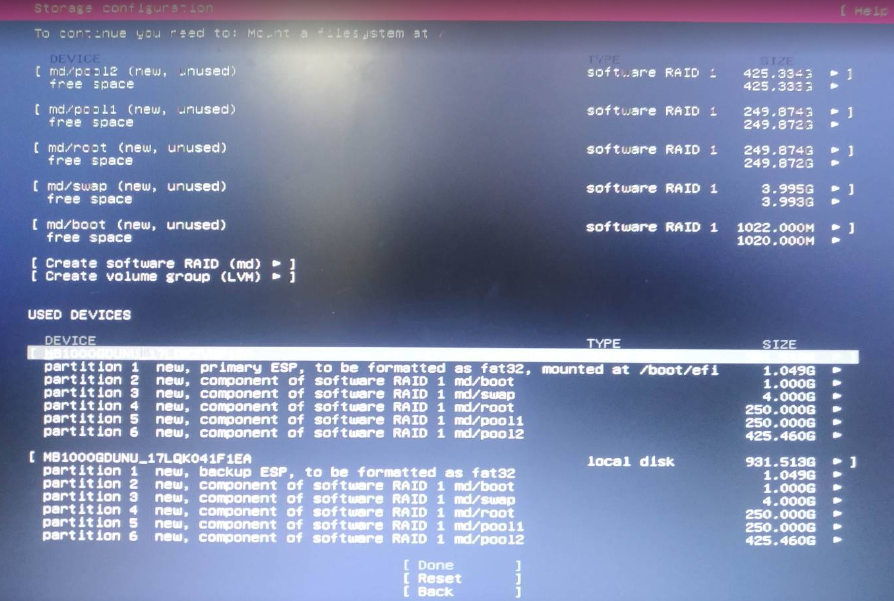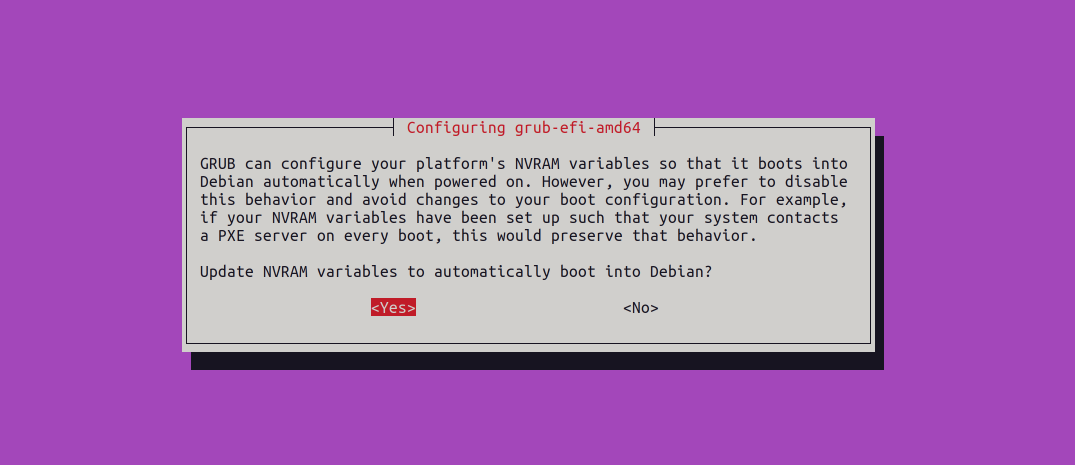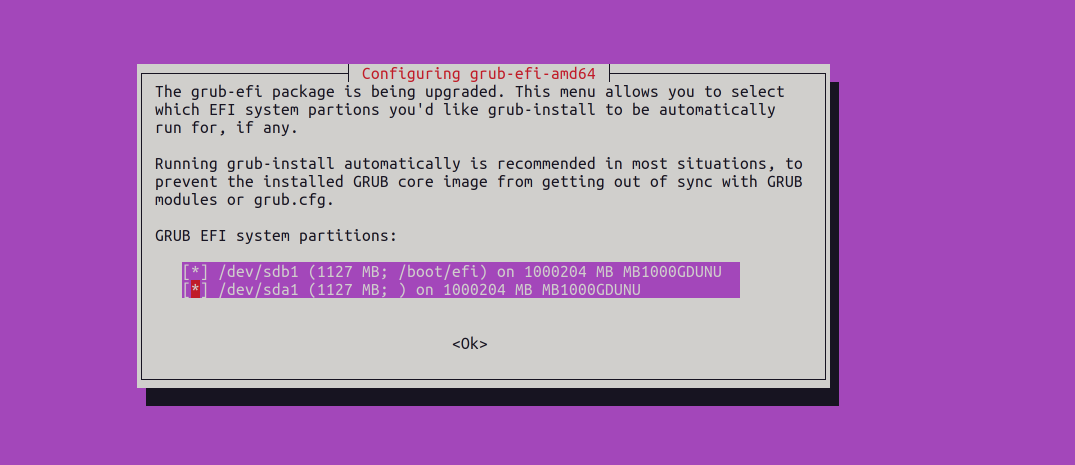Redundant UEFI boot And Keep Multiple ESP Synced On Ubuntu
ESP - Efi System Partition
One of the traditional and old problems with UEFI booting on servers is that it had a bad story if you wanted to be able to boot off multiple disks. Each disk needed its own EFI System Partition (ESP) and you either manually kept them in synchronization (perhaps via rsync in a cron job) or put them in a Linux software RAID mirror with the RAID superblock at the end and hoped hard that nothing ever went wrong. reference: Ubuntu 22.04 with multiple disks and (U)EFI booting
Partitioning Scheme:

see : primary ESP, to be formatted as fat32 and backup ESP, to be formatted as fat32
In the 22.04 server installer, if you mark additional disks as extra boot drives, it will create an ESP partition on them and add them to this list of configured ESPs.
UEFI and RAID with GPT disks.
$ sudo parted -l
Model: ATA MB1000GDUNU (scsi)
Disk /dev/sda: 1000GB
Sector size (logical/physical): 512B/512B
Partition Table: gpt
Disk Flags:
Number Start End Size File system Name Flags
1 1049kB 1128MB 1127MB fat32 boot, esp
2 1128MB 2202MB 1074MB
3 2202MB 6497MB 4295MB
4 6497MB 275GB 268GB
5 275GB 543GB 268GB
6 543GB 1000GB 457GB
Model: ATA MB1000GDUNU (scsi)
Disk /dev/sdb: 1000GB
Sector size (logical/physical): 512B/512B
Partition Table: gpt
Disk Flags:
Number Start End Size File system Name Flags
1 1049kB 1128MB 1127MB fat32 boot, esp
2 1128MB 2202MB 1074MB
3 2202MB 6497MB 4295MB
4 6497MB 275GB 268GB
5 275GB 543GB 268G
Model: Linux Software RAID Array (md)
Disk /dev/md127: 1072MB
Sector size (logical/physical): 512B/512B
Partition Table: gpt
Disk Flags:
Number Start End Size File system Name Flags
1 1049kB 1071MB 1070MB ext4
Model: Linux Software RAID Array (md)
Disk /dev/md125: 268GB
Sector size (logical/physical): 512B/512B
Partition Table: gpt
Disk Flags:
Number Start End Size File system Name Flags
1 1049kB 268GB 268GB btrfs
Model: Linux Software RAID Array (md)
Disk /dev/md123: 457GB
Sector size (logical/physical): 512B/512B
Partition Table: gpt
Disk Flags:
Number Start End Size File system Name Flags
1 1049kB 457GB 457GB btrfs
Model: Linux Software RAID Array (md)
Disk /dev/md126: 4290MB
Sector size (logical/physical): 512B/512B
Partition Table: gpt
Disk Flags:
Number Start End Size File system Name Flags
1 1049kB 4289MB 4288MB linux-swap(v1) swap
Model: Linux Software RAID Array (md)
Disk /dev/md124: 268GB
Sector size (logical/physical): 512B/512B
Partition Table: gpt
Disk Flags:
Number Start End Size File system Name Flags
1 1049kB 268GB 268GB btrfs
$ sudo lsblk /dev/sda
NAME MAJ:MIN RM SIZE RO TYPE MOUNTPOINTS
sda 8:0 0 931.5G 0 disk
├─sda1 8:1 0 1G 0 part
├─sda2 8:2 0 1G 0 part
│ └─md127 9:127 0 1022M 0 raid1
│ └─md127p1 259:0 0 1020M 0 part /boot
├─sda3 8:3 0 4G 0 part
│ └─md126 9:126 0 4G 0 raid1
│ └─md126p1 259:1 0 4G 0 part [SWAP]
├─sda4 8:4 0 250G 0 part
│ └─md125 9:125 0 249.9G 0 raid1
│ └─md125p1 259:3 0 249.9G 0 part /
├─sda5 8:5 0 250G 0 part
│ └─md123 9:123 0 249.9G 0 raid1
│ └─md123p1 259:2 0 249.9G 0 part /poo1
└─sda6 8:6 0 425.5G 0 part
└─md124 9:124 0 425.3G 0 raid1
└─md124p1 259:4 0 425.3G 0 part /pool2
$ sudo lsblk /dev/sdb
NAME MAJ:MIN RM SIZE RO TYPE MOUNTPOINTS
sdb 8:16 0 931.5G 0 disk
├─sdb1 8:17 0 1G 0 part /boot/efi
├─sdb2 8:18 0 1G 0 part
│ └─md127 9:127 0 1022M 0 raid1
│ └─md127p1 259:0 0 1020M 0 part /boot
├─sdb3 8:19 0 4G 0 part
│ └─md126 9:126 0 4G 0 raid1
│ └─md126p1 259:1 0 4G 0 part [SWAP]
├─sdb4 8:20 0 250G 0 part
│ └─md125 9:125 0 249.9G 0 raid1
│ └─md125p1 259:3 0 249.9G 0 part /
├─sdb5 8:21 0 250G 0 part
│ └─md123 9:123 0 249.9G 0 raid1
│ └─md123p1 259:2 0 249.9G 0 part /poo1
└─sdb6 8:22 0 425.5G 0 part
└─md124 9:124 0 425.3G 0 raid1
└─md124p1 259:4 0 425.3G 0 part /pool2
/boot/efi is mounted because of this entry in /etc/fstab added by Ubuntu installation
$ sudo grep efi /etc/fstab
# /boot/efi was on /dev/sdb1 during curtin installation
/dev/disk/by-uuid/1F01-E5A8 /boot/efi vfat defaults 0 1
Does Ubuntu takes care of ESP sync? Given the case that I lost currently mounted /boot/efi, are backup ESP up to date? Otherwise, do I have to manually mount and sync them all?
Yes, if
grub-efi-amd64is configured to use those as the ESP:s then Ubuntu will automatically sync them all. And they don’t need to be mounted to be synced, myself I don’t have/boot/efimounted infstabat all. Reference : Ubuntu installation keep multiple ESP synced
Installing and configuring the GRUB boot loader to a software-based RAID1 array
The Debian OS installer by default only installs the GRUB boot loader to the main hard disk in the software-based RAID array. It is best to install the boot loader to all disks in the RAID1 array in the event that (1) a drive failure occurs and you need to boot from the secondary drive or (2) due to swapping hard drive connections physically in the chassis, the other drive becomes the primary drive.
Reconfiguring grub
$ sudo dpkg-reconfigure grub-efi-amd64
The grub reconfigure script then checks for all partitions with the ESP GPT type and allows the user to select both. After that change future package updates/re-installs will update both ESPs.


output:
Installing grub to /boot/efi.
Installing for x86_64-efi platform.
Installation finished. No error reported.
Installing grub to /var/lib/grub/esp.
Installing for x86_64-efi platform.
Installation finished. No error reported.
Sourcing file `/etc/default/grub'
Sourcing file `/etc/default/grub.d/init-select.cfg'
Generating grub configuration file ...
Found linux image: /boot/vmlinuz-5.15.0-76-generic
Found initrd image: /boot/initrd.img-5.15.0-76-generic
Warning: os-prober will not be executed to detect other bootable partitions.
Systems on them will not be added to the GRUB boot configuration.
Check GRUB_DISABLE_OS_PROBER documentation entry.
Adding boot menu entry for UEFI Firmware Settings ...
done
Processing triggers for shim-signed (1.51.3+15.7-0ubuntu1) ...
Show which devices grub is configured to use
$ sudo debconf-show grub-efi-amd64
grub2/no_efi_extra_removable: false
grub2/kfreebsd_cmdline:
* grub2/linux_cmdline:
grub2/kfreebsd_cmdline_default: quiet splash
* grub2/linux_cmdline_default:
grub2/unsigned_kernels_title:
grub-efi/install_devices_disks_changed:
* grub-efi/install_devices: /dev/disk/by-id/ata-MB1000GDUNU_17LDK2VMF1EA-part1, /dev/disk/by-id/ata-MB1000GDUNU_17LQK041F1EA-part1
grub-efi/install_devices_empty: false
grub2/unsigned_kernels:
grub-efi/install_devices_failed: false
grub-efi/partition_description:
* grub2/update_nvram: true
* grub-efi/install_devices: /dev/disk/by-id/ata-MB1000GDUNU_17LDK2VMF1EA-part1, /dev/disk/by-id/ata-MB1000GDUNU_17LQK041F1EA-part1